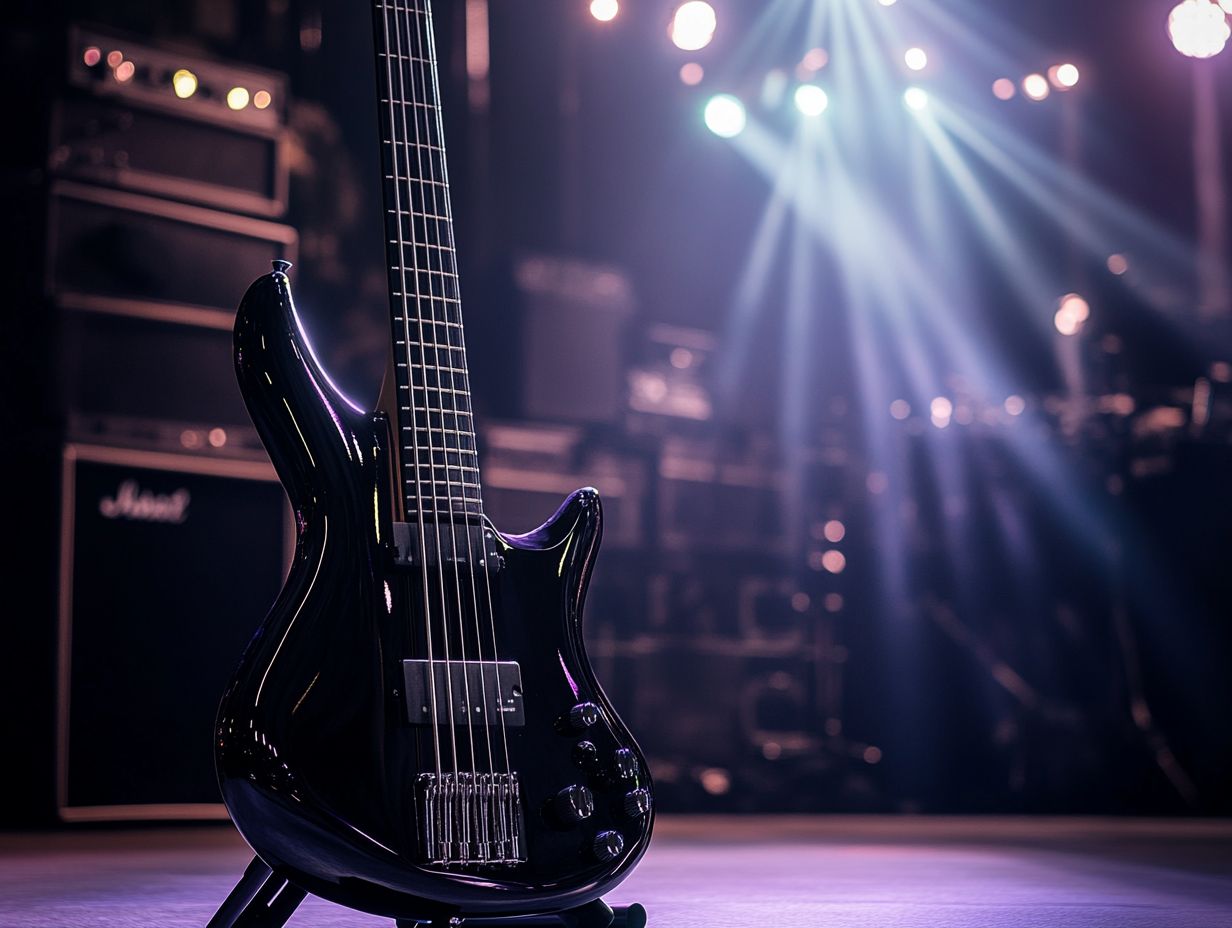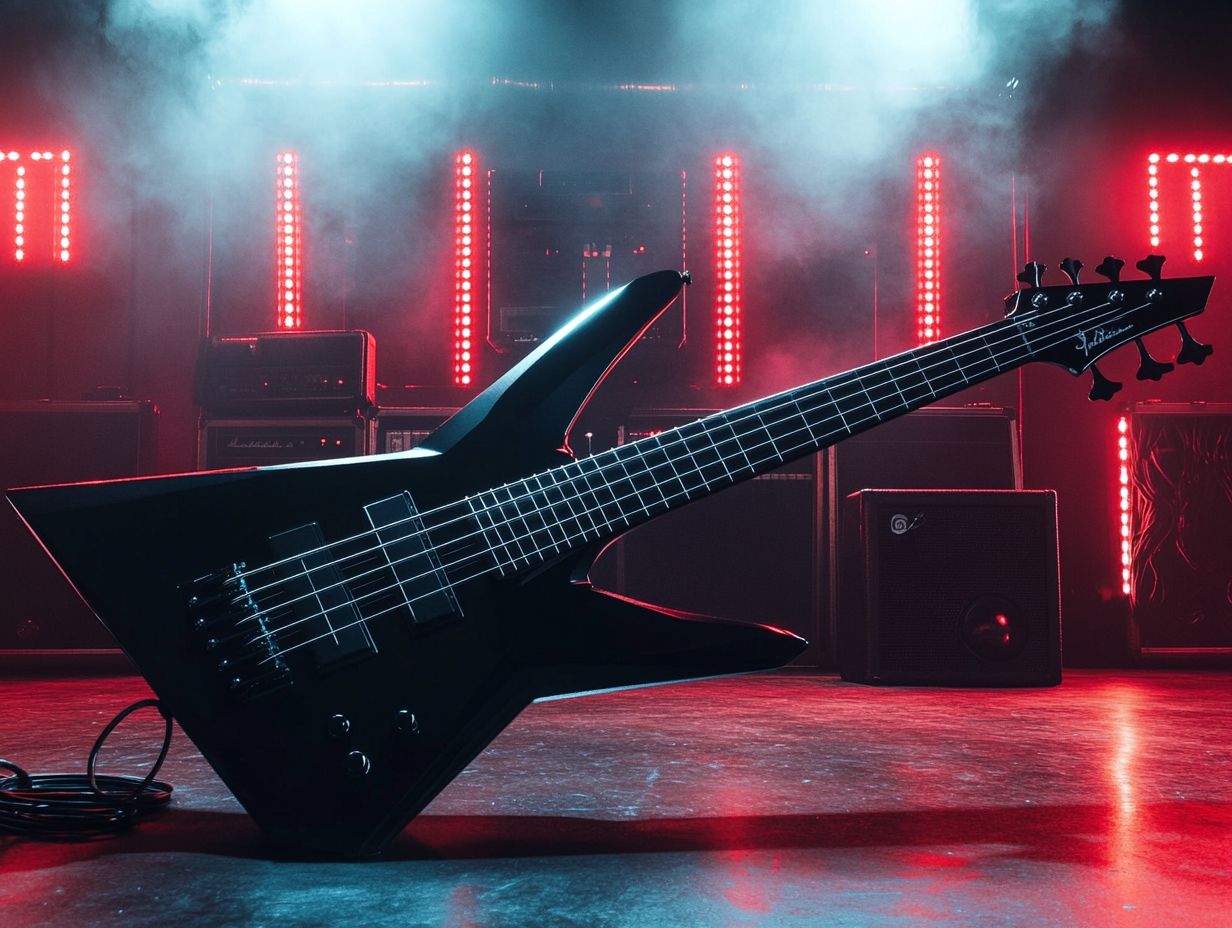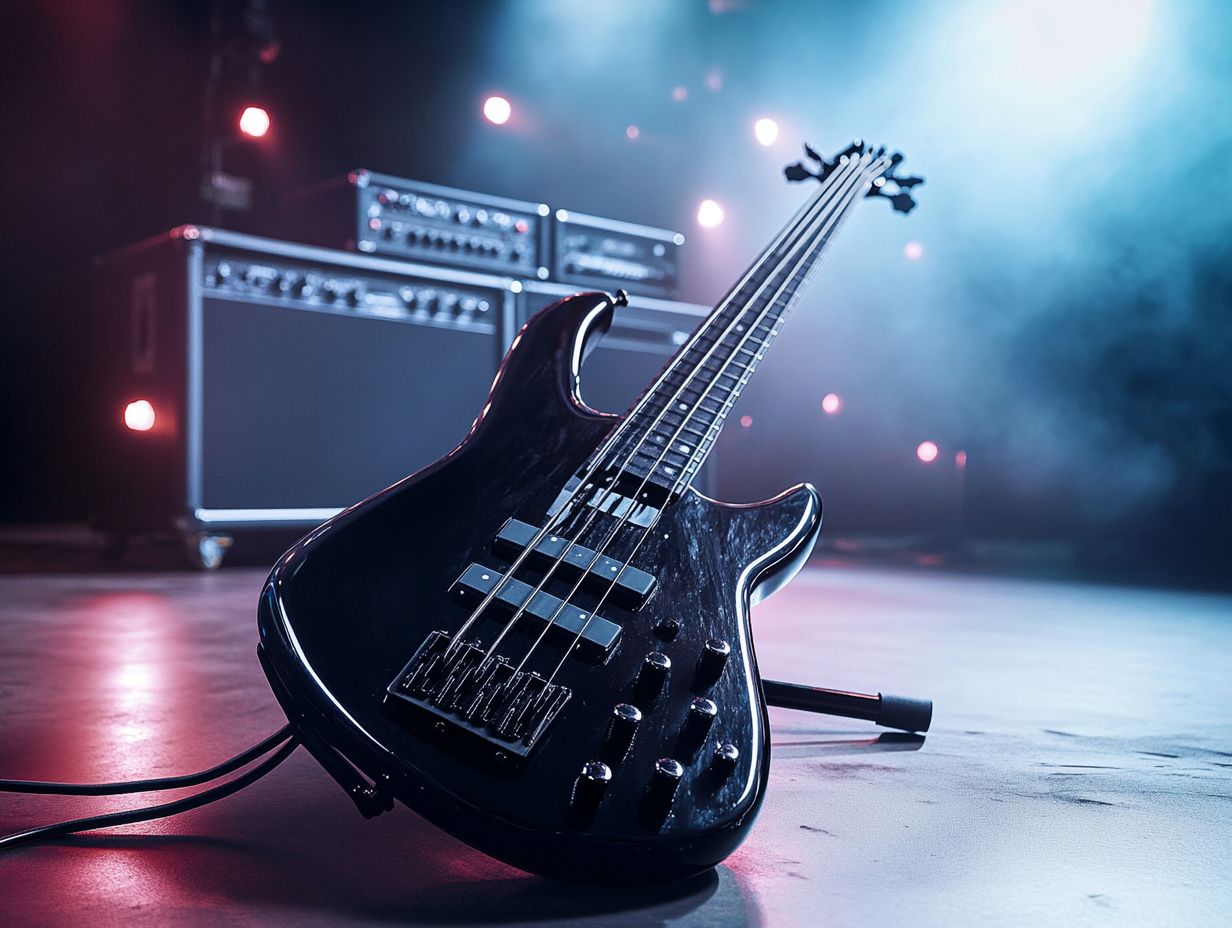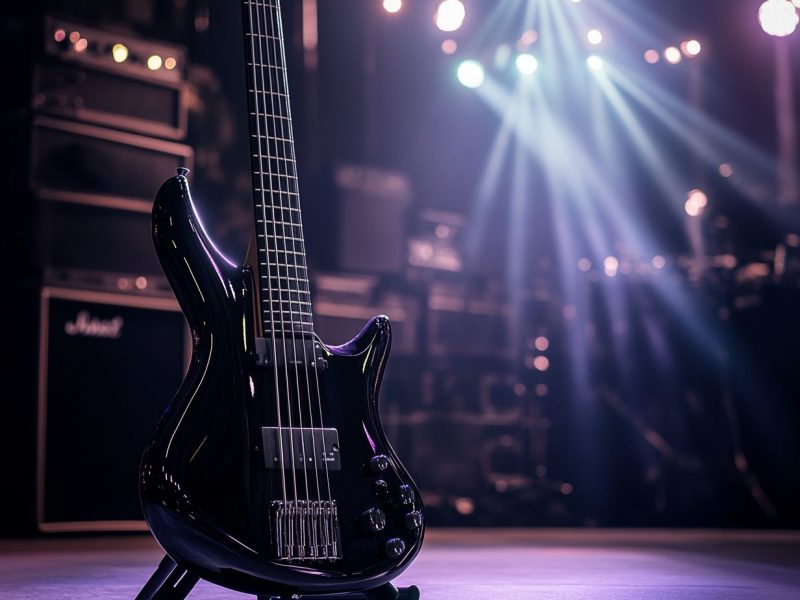Selecting the appropriate bass guitar is essential for any metal musician, as it can substantially influence sound, performance, and the overall musical experience.
Given the distinctive demands of metal music—characterized by heavy riffs, aggressive rhythms, and intricate melodies—identifying a bass that can effectively address these challenges is vital.
This article examines key features to consider, including pickup types, neck construction, and tuning stability, while also highlighting premier bass models specifically designed for the metal genre.
Furthermore, it offers guidance on selecting the ideal instrument to suit your individual style, as well as essential maintenance practices to ensure your bass remains in optimal condition.
Engage with this content to enhance your metal sound.
Why Choosing the Right Bass Guitar is Important for Metal Music

Selecting the appropriate bass guitar is essential for achieving the powerful and aggressive sound characteristic of metal music. The metal genre requires a versatile instrument capable of accommodating intricate bass guitar techniques and heavy metal bass tones, making the selection process crucial for both studio recordings and live performances.
The choice of a bass guitar extends beyond mere aesthetics; it significantly impacts the instrument’s ability to navigate the complex music theory inherent in metal. For example, while a four-string bass may be adequate for a traditional approach, many musicians prefer a five-string or even a six-string model to explore a broader sonic spectrum, thereby enhancing the depth of their riffs.
Additionally, the decision between active and passive pickups can greatly affect tonal quality, influencing the overall attack and sustain of each note. Craftsmanship is also a vital consideration, as a well-constructed bass will not only endure the demands of aggressive playing but will also provide a reliable foundation for the heavy rhythms that are often required in metal music.
Key Features to Look for in a Bass Guitar for Metal
When selecting a bass guitar for metal, it is essential to consider key features that enhance performance and sound quality.
Options such as active pickups provide a higher output, making them particularly suitable for heavy metal bass. Conversely, passive pickups deliver a warm sound that can complement a variety of bass guitar tones.
Furthermore, the construction type, including neck-through design versus bolt-on neck, along with the choice of a solid body bass, significantly influences the instrument’s playability and sustain.
Therefore, it is critical for musicians to select a lightweight and durable bass that aligns with their specific requirements.
Types of Pickups
The type of pickups utilized in a bass guitar plays a crucial role in shaping its overall sound, particularly within the realm of metal music. Active pickups, recognized for their high-output capabilities, produce a punchy and aggressive bass guitar tone, making them well-suited for metal riffs and heavy distortion.
Conversely, passive pickups offer a more organic tone, which can be advantageous for nuanced bass guitar techniques such as slap bass and fingerstyle playing, thereby creating a versatile sound spectrum that accommodates various musical styles.
When comparing these two types, it becomes evident that active pickups tend to cater to musicians seeking a pronounced cutting edge, often exemplified by brands such as EMG and Cort. Many metal bassists commend the clarity and sustain provided by these pickups, which enhance growling distortion and facilitate rapid palm muting.
In contrast, models from Fender or Ibanez are representative of passive pickups, valued for their warm, rounded tones that allow intricate playing styles to be showcased without compromising the essential low end.
User reviews frequently emphasize that the selection of pickups can significantly impact performance during live shows, illuminating venues with uniquely textured soundscapes.
Neck Construction
Neck construction is a crucial aspect of bass guitar design that significantly influences both playability and tone. A neck-through design offers seamless access to the fretboard and enhanced sustain, making it a preferred choice for metal bass guitarists who prioritize speed and precision.
In contrast, a bolt-on neck provides easier maintenance and repair options while still delivering quality sound, allowing musicians to customize their instruments to align with their playing styles and preferences.
Each design type presents distinct advantages that cater to various playing techniques and genres. For example, players who favor aggressive slap techniques may find that neck-through models, such as the Ibanez BTB series, offer exceptional stability and resonance, resulting in a rich, full-bodied tone.
Conversely, a classic Fender Precision Bass equipped with a bolt-on neck facilitates the effortless swapping of necks, granting players the flexibility to experiment with different setups.
Ultimately, the choice between these two approaches depends on individual requirements, underscoring the significance of personal preference in selecting the appropriate bass guitar.
Tuning Stability

Tuning stability is a crucial factor for any bass guitar, particularly in the dynamic realm of metal music. A reliable instrument must maintain its tuning during intense performances and studio recording sessions, significantly influenced by the selection of bass strings, string gauge, and bridge type.
A comprehensive understanding of how these elements interact can assist musicians in achieving optimal sound quality and performance consistency, whether performing live or recording in the studio.
In metal music, where the precision of each note is essential to defining the band’s rhythm and energy, a bass guitar that remains in tune is imperative. Various factors, including the nut material, tuning pegs, and even environmental conditions, can impact tuning stability.
For bassists aiming to enhance their performance, it is essential to select high-quality strings that align with their playing style and to closely monitor their tension and condition. Regularly changing strings, maintaining their cleanliness, and ensuring proper setup can significantly enhance tuning integrity.
By understanding these components, musicians can ensure their instrument delivers the reliability required to match the intensity of their music.
Top Bass Guitar Models for Metal
In the realm of bass guitars suitable for metal music, several models are distinguished by their exceptional craftsmanship and capacity to produce potent tones that align with the genre’s demands.
These specialized bass guitars have undergone thorough evaluations by musicians, highlighting their performance in both studio and live environments.
Whether one is in search of a budget-friendly option or a premium model, selecting the appropriate instrument will ultimately elevate the overall playing experience and sound quality.
Features and Benefits of Each Model
Each leading bass guitar model for metal is characterized by unique features and benefits that specifically address the needs of bassists within the genre. Renowned bass guitar manufacturers have meticulously engineered their instruments to provide exceptional sound quality, durability, and playability, thereby enabling musicians to execute intricate bass guitar techniques with precision.
These models are suitable for both live performances and studio environments, rendering them versatile options for a wide range of musical applications.
The robust construction of these bass guitars typically incorporates premium tonewoods and advanced electronics, ensuring a rich tonal palette capable of cutting through dense mixes with clarity. Their ergonomic designs are intended to promote comfort during extended playing sessions, allowing bassists to concentrate on their performance without the distraction of discomfort.
Additionally, features such as active pickups and adjustable bridges enhance sound manipulation capabilities, granting users the flexibility to fine-tune their tone. This combination of high-quality materials and thoughtful design significantly contributes to performance excellence, give the power toing bassists to elevate their sound across various musical contexts.
Tips for Choosing the Right Bass Guitar for Your Playing Style
The selection of an appropriate bass guitar necessitates careful consideration of one’s playing style and musical preferences. Whether one is attracted to the smooth tones produced by a fretless bass or the robust sound of a gig-ready bass suitable for live performances, it is crucial to understand individual needs.
The instrument’s versatility, along with factors such as comfort, weight, and tonal range, significantly impacts performance and overall satisfaction.
Factors to Consider

Several factors should be carefully evaluated when selecting a bass guitar, including string type, bridge configuration, and ergonomic design. The choice of string gauge and type can significantly influence the instrument’s playability and sound quality, while the bridge type can affect both tuning stability and sustain.
Customer satisfaction and user reviews are critical components in the decision-making process, as they provide valuable insights into the long-term performance and reliability of the instrument.
Additionally, it is essential to consider the materials utilized in the construction of the bass, as the selection of wood directly impacts both tone and resonance. For example, maple typically offers a brighter sound, whereas mahogany is known for producing a warmer tone.
An ergonomic design is also vital, as it can greatly enhance comfort during extended playing sessions, thereby affecting overall performance. Many buyers emphasize the importance of the instrument’s feel in relation to their musical expression.
User reviews often highlight key features such as the durability and responsiveness of the electronics, which can significantly influence long-term satisfaction. A comprehensive understanding of these elements enables musicians to select a bass that aligns with their style and requirements.
Maintaining and Caring for Your Bass Guitar
The proper maintenance and care of a bass guitar are crucial for ensuring its longevity and optimal performance.
Regular cleaning, diligent string care, and careful attention to the craftsmanship of the instrument can greatly enhance both its playability and sound quality.
By adopting effective maintenance practices and taking care of a well-constructed bass, musicians can enjoy a dependable instrument that is capable of withstanding the demands of studio recording as well as live performances.
Proper Storage and Maintenance Techniques
Proper storage and maintenance techniques are essential for preserving the condition and sound quality of a bass guitar.
Selecting an appropriate environment is equally crucial, as fluctuations in humidity and temperature can negatively impact the wood and electronics of the instrument. Ideally, a dedicated space with stable conditions should be established to prevent warping or damage.
For individuals who frequently perform or travel, investing in a hard case not only provides superior protection but also ensures that the instrument maintains its tuning.
Regularly inspecting the neck for appropriate relief and making necessary adjustments can enhance playability. Additionally, utilizing a microfiber cloth to wipe down the strings and body after each session aids in removing oils and dirt, thereby extending the lifespan of both the strings and the finish.
By adhering to these guidelines, one can significantly prolong the lifespan and sound integrity of their bass guitar.
Final Thoughts and Recommendations
Selecting the most suitable bass guitar for metal music requires a thorough evaluation of several factors, including sound quality, playability, and price range.
It is essential to assess the tonal characteristics, weight, and construction of various models to refine one’s options. Musicians must navigate the extensive array of available instruments, ensuring that their choice aligns with their unique playing style and musical objectives.
By considering high-quality bass guitar options and examining user reviews, musicians can make informed decisions that cater to their specific requirements. Whether in search of an affordable bass guitar or a premium model, understanding the key features and benefits will significantly enhance their playing experience and overall satisfaction.
Ultimately, the appropriate bass guitar can serve as a transformative instrument in a musician’s journey, facilitating a harmonious integration of creativity and technical proficiency.
Frequently Asked Questions

What is the best bass guitar for metal?
The best bass guitar for metal is subjective and varies depending on personal preference. Some popular options among metal musicians include the Fender Precision Bass, Ibanez SR series, and the Warwick Corvette. It is important to try out different bass guitars and find one that feels comfortable and suits your playing style.
What features should I look for in a bass guitar for metal?
When searching for the best bass guitar for metal, there are a few features that are important to consider. These include a solid and durable construction, powerful pickups, and a fast and comfortable neck. It is also beneficial to have a bass with a wide frequency range to achieve the heavy and aggressive tones often found in metal music.
Can I use any bass guitar for playing metal music?
While any bass guitar can technically be used to play metal music, some may not produce the desired tone or be able to handle the aggressive playing style. It is recommended to use a bass that is specifically designed for metal music to achieve the best sound and performance.
Do I need a 5-string bass for playing metal music?
A 5-string bass is not necessary for playing metal music, but it can be beneficial in achieving a wider range of tones. The added low B string allows for extended range and more versatility in playing. However, many metal bassists still use a 4-string bass and achieve great results.
Is it necessary to have a high-end bass guitar for playing metal?
Having a high-end bass guitar is not necessary for playing metal music. While high-end basses may have superior construction and components, there are many affordable options that can still produce great metal tones. It is ultimately more important to find a bass that feels comfortable and suits your playing style.
Can I modify my current bass guitar for playing metal?
Yes, you can modify your current bass guitar for playing metal music. This can include changing the pickups, adding a preamp, or adjusting the action and setup. However, it is important to note that not all basses are suitable for heavy modifications, so it is best to consult with a professional before making any changes.


 Discovering the Differences: Keyboard Amplifiers vs PA Speakers
Discovering the Differences: Keyboard Amplifiers vs PA Speakers